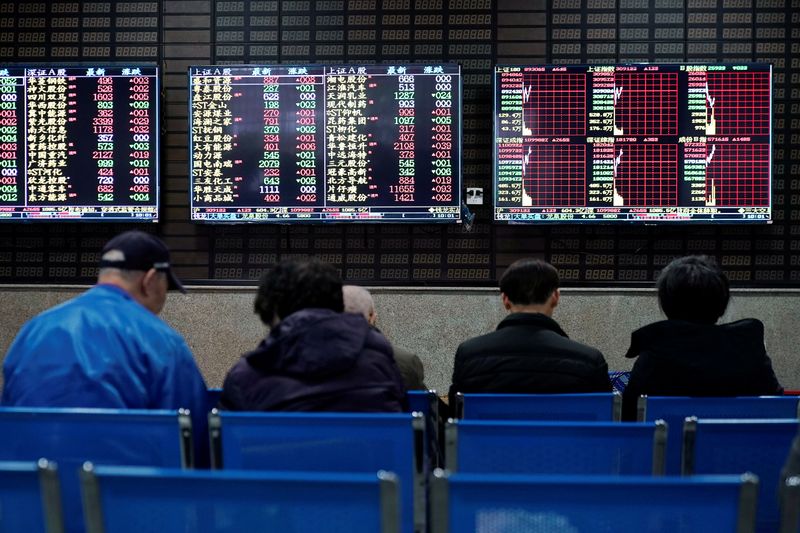This post was originally published on this site
https://i-invdn-com.akamaized.net/trkd-images/LYNXMPEG5400D_L.jpg
NEW YORK (Reuters) – Asian stocks were set to hold tight ranges on Friday after a mixed Wall Street session and as investors awaited key U.S. jobs data while sustained hopes about a global economic recovery kept pressure on the safe-haven dollar.
The week’s global equity rally lost some steam on Thursday as traders took winnings from seven days of gains, backing away ahead of Friday’s nonfarm payrolls data, which is expected to show further deterioration in the U.S. jobs market.
Australian S&P/ASX 200 futures lost 0.2% in early trading while {{178|Japan’s NiNikkei 225 futures (NKc1) slipped 0.4%.
Hong Kong’s Hang Seng index futures (HSI) (HSIc1) lost 0.55%.
E-mini futures for the S&P 500 rose 0.14%.
The dollar index (=USD) fell 0.6%, with the euro (EUR=) up 0.04% to $1.134.
“This market has gone up so far so fast there’s a lot of people saying, ‘I’m going to take a little profit,'” said Jim Paulson, chief investment strategist at The Leuthold Group in Minneapolis.
MSCI (NYSE:MSCI)’s global stock index slipped 0.15% on Thursday, while the S&P 500 (SPX) lost 0.34% and the Nasdaq Composite (IXIC) lost 0.69%. The Dow Jones Industrial Average (DJI) held a slender gain of 0.05% to 26,281.82.
The pan-European STOXX 600 index (STOXX) lost 0.72%.
Friday’s U.S. employment report is expected to show nonfarm payrolls fell in May by 8 million jobs after a record 20.54 million plunge in April, according to a Reuters survey of economists.
The U.S. unemployment rate is forecast to rocket to 19.8%, a post-World War Two record, from 14.7% in April.
Currency markets, however, showed continued confidence in the revival of the global economy, particularly after the European Central Bank pledged more support.
The euro jumped to a 12-week high against the dollar on Thursday after the ECB increased the size of emergency bond purchases by 600 billion euros ($674 billion) to 1.35 trillion euros, more than the 500 billion-euro increase analysts had expected.
The ECB also extended the program until at least June 2021 and pledged to reinvest returns in a reminder of how far some governments will go to support the economy.
“European policy makers have picked up the baton with respect to more policy stimulus – both monetary and fiscal. This is showing up more in currencies than it is in equities,” Ray Attrill, head of FX Strategy Markets at National Australia Bank (OTC:NABZY) wrote to clients on Friday morning.
Next week, the U.S. Federal Reserve holds its regular two-day policy meeting.
The dollar index, (=USD) which measures the greenback against a basket of major currencies, declined for the past two weeks through Thursday as risk sentiment improved on optimism that the worst of the economic downturn from the coronavirus has passed.
The Australian dollar rose 0.07% versus the greenback to $0.695. The Aussie, one of the best recent performers due to the increase in risk appetite, on Thursday reached as high as $0.6987, the strongest since Jan. 3.
Traders raising cash for riskier investments also sold 10-year U.S. Treasury notes for the fourth consecutive day on Thursday, lifting the yield to 0.8251% from 0.761% the day before.
Oil prices were little changed in choppy trade as investors awaited a decision from top crude producers on whether to extend record output cuts. U.S. crude (CLc1) recently fell 0.16% to $37.35 per barrel and Brent (LCOc1) was flat on the day.
Spot gold added 0.2% to $1,713.09 an ounce.
Gold was up more than 1% for the day on Thursday as weakened equity markets lent some support to demand for the metal.

